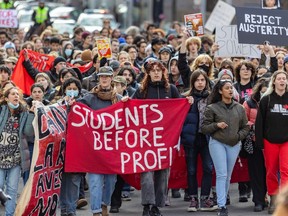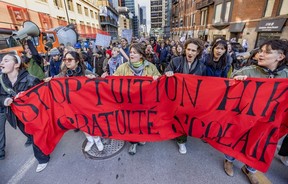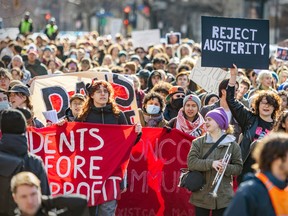
Chanting slogans and bearing placards, they jeered Premier François Legault outside his offices across from McGill.

Article content
Chanting “Education is a right, not just for the rich and white,” hundreds of Concordia University students marched down Sherbrooke St. Wednesday afternoon before joining their peers at McGill in the latest protest against tuition hikes targeting anglophone universities in Quebec.
“I don’t believe in the tuition hikes,” said Sofia Ciandella, a recent graduate of Concordia’s communications program from New Jersey who is taking further courses to improve her French. “I think it’s xenophobic and discretionary to people who are excluded in Quebec — especially in the fact they’re raising the tuition for students coming from francophone countries in Africa yet keeping prices the same for France and Belgium. It’s blatant that race is involved.”
Advertisement 2
Article content
Article content
The tuition hikes are already being felt at the university, she said, as applications from out-of-province and international students drop, forcing the university to reduce class numbers and services.
The students marched from Concordia University along Sherbrooke St. to McGill University, chanting slogans and bearing placards, accompanied by a police escort directing traffic. They stopped before the offices of François Legault, situated across the street from McGill, to listen to speeches and jeer the premier.

Many of the students were also not attending classes after groups representing more than 20,000 Concordia and McGill students voted to strike to protest against the Legault government’s tuition overhaul.
Students in arts and sciences at Concordia voted to strike from Monday to Friday this week, while the engineering and computer science students were holding a three-day strike starting Wednesday.
The latest pause in class attendance follows a one-day strike in November and a three-day strike last month.
At Concordia, this week’s walkout will affect about 21,000 students. At McGill, where students were on spring break last week, groups representing about 1,600 students voted to strike, student leaders said.
Article content
Advertisement 3
Article content
Angelica Antonakopoulos, academic co-ordinator for the Arts and Science Federation of Associations at Concordia, said students picketed outside of classes to advise other students of the strike and encourage them not to attend. Some professors cancelled classes in solidarity, while others gave asynchronous classes online. Others chose to continue to keep teaching.
Concordia spokesperson Vannina Maestracci said Wednesday a small number of classes had been disrupted by picketing, but the majority of classes went ahead as planned.
“We understand that students want to express their disapproval of the new tuition measures, but we believe that disrupting their own education, inside university buildings, with impacts only on fellow students and the university, is a counter-productive way to express that discontent.”

Last month, Concordia and McGill filed separate lawsuits against the government, seeking judicial reviews of the tuition hikes, complaining they could devastate their enrolment, financial situation and reputations nationally and internationally. Both universities have already reported steep drops in enrolment for next year’s school semesters.
Advertisement 4
Article content
The strike and marches are a way to put pressure on the Quebec government, along with lawsuits filed by McGill and Concordia, Antonakopoulos said.
“We’re hoping to continue to give the lawsuits validity and importance in the court of public opinion, and by continuing to make noise to show the general public, ‘Hey, we think this is really important.’ ”
They’re also a way to make students aware the tuition hikes will not only affect future students, but also current ones as the drops in revenue at the already cash-strapped university lead to staff reductions, larger class sizes, fewer teaching assistants and cuts to extracurricular programs like clubs and sports teams.
“Degrees are worth something retroactively, so if Concordia’s reputation plummets, then our degrees will be worth less in terms of the prestige of Concordia in five to 10 years from now,” Antonakopoulos said.
Addressing the students before the march, Concordia professor Anna Sheftel said universities are a place to open ourselves to the world, but “these tuition hikes attack that conception of universities. The CAQ government is trying to isolate us from the world, something that is toxic not just for universities, not just for teaching and research, but it’s just toxic for Quebec.”
Harry Callahan, a third-year student from Newfoundland, said the hikes here were already having an impact in his home province.

“For many of my friends who wanted to come to Concordia, they’re looking for more affordable universities now,” he said. “It’s a shame, because Concordia is a nice community and the tuition hikes will really have an impact.”
Ates Balsoy, a first-year student from Turkey, said he visited Montreal in the summer of 2022 and fell in love with its vibrant cultural scene. The university has already started reducing some services, like the free vegan lunches that were important for students with scarce means. Others are sure to follow, he said.
“It’s horrible for Quebec because students help the economy by going to cafés and restaurants and renting apartments,” he said. “So they’re shooting their own legs.”
Recommended from Editorial
Advertisement 5
Article content
Article content

